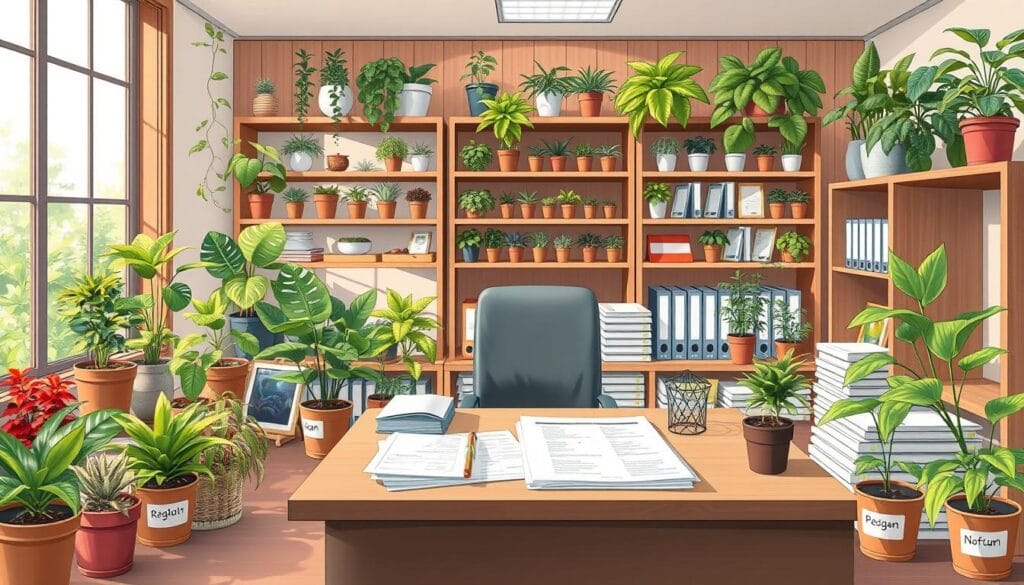Overview of the Horticultural Crops Directorate

I’ve always been fascinated by the rich harvests we enjoy. The policies, regulations, and frameworks that shape our agriculture are complex. Today, we explore the Horticultural Crops Directorate (HCD) in Kenya. It plays a crucial role in the country’s horticulture growth.
The HCD is a key part of the Agriculture and Food Authority (AFA). It offers hope to farmers, processors, and exporters. We’ll see how it tackles the challenges of the horticulture sector.
The Horticultural Crops Authority Bill, 2024, is at the center of our journey. It aims to change the rules for the horticulture industry. We’ll look at its functions, licensing, and export rules to see how it keeps the industry competitive.
We’ll also dive into the HCD’s work on plant protection, pest management, and food safety. These are vital for keeping Kenya’s horticulture safe and sustainable.
Let’s explore the policies and frameworks that shape Kenya’s horticulture. We’ll see how the Horticultural Crops Directorate affects farmers, entrepreneurs, and consumers.
Table of Contents
Introduction to Horticultural Crops Directorate
The Horticultural Crops Directorate (HCD) is key to Kenya’s horticultural growth. It was set up to meet the changing needs of this important sector. The HCD has grown in scope and influence over the years.
Historical Development and Evolution
The HCD started in the 1980s. The Kenyan government saw horticulture as crucial for economic growth and food security. It began by coordinating production, marketing, and exports of horticultural crops.
Later, its role expanded. It now handles regulatory, developmental, and support tasks.
Core Mission and Vision
The HCD aims to boost the horticultural sector’s productivity and profits. It works hard to grow the industry. This way, Kenyan farmers and producers can take advantage of new opportunities at home and abroad.
Its vision matches national agricultural policies. It aims to make Kenya a top exporter of quality horticultural crops.
Organizational Structure
The HCD has a clear structure. It works closely with bodies like the Kenya Plant Health Inspectorate Service (KEPHIS) and the Kenya Bureau of Standards (KEBS). This teamwork helps the directorate manage the horticultural value chain well.
Regulatory Framework and Legal Mandates
The horticultural sector in Kenya is guided by strict rules. These include the Crops Act, Crops (Horticultural Crops) Regulations, and the Agriculture and Food Authority Act. These laws aim to support sustainable growth, ensure food safety, and maintain high-quality standards for horticultural crops.
The proposed Horticulture Crops Authority (HCA) Bill is a key part of this framework. It aims to bring together existing regulations under one roof. If passed, the HCA Bill will cover all horticultural produce grown, processed, or marketed in Kenya. It will also apply to imports and exports. This framework aims to balance growth with strict horticulture regulations, agricultural policies, and crop management practices.
The HCA Bill would give the Horticultural Crops Directorate new powers. They would oversee:
- Licensing and registration of horticultural players
- Enforcing compliance with quality and safety standards
- Facilitating market development and trade promotion
- Coordinating research and development initiatives
- Promoting sustainable production and environmental protection
The HCA Bill aims to bring clarity and consistency to the horticultural sector in Kenya. It seeks to create a better environment for growth while protecting consumers and promoting crop management practices.
“The proposed HCA Bill represents a significant step forward in modernizing the regulatory landscape for horticulture in Kenya. It will help to streamline processes, improve compliance, and drive sustainable development across the entire value chain.”
As the industry grows, the rules governing horticulture in Kenya will be key. They will help balance economic goals with food safety, quality, and environmental care.
Key Functions of the Horticultural Crops Directorate
The Horticultural Crops Directorate (HCD) oversees key functions for the U.S. horticulture industry. It handles crop production management, quality control and standards, and market development initiatives. These efforts boost productivity, incomes, and competitiveness in the industry.
Crop Production Management
The HCD works with farmers to improve crop management practices. They aim for high yields and sustainable production. They offer technical advice, help with quality inputs, and promote best practices in irrigation, pest management, and post-harvest handling.
Quality Control and Standards
Keeping a tight grip on quality control and standards is crucial for the HCD. They set and enforce guidelines for grading, packaging, and labeling of horticultural crops. This ensures consumer trust and market access. Regular checks and certifications keep these standards high.
Market Development Initiatives
The HCD leads in market development for the horticulture sector. They organize trade fairs, create market connections, and promote horticultural products. They also work with industry partners to find new opportunities and solve challenges.
The Horticultural Crops Directorate is essential for a thriving and sustainable horticulture industry in the U.S.
| Crop Production Management | Quality Control and Standards | Market Development Initiatives |
|---|---|---|
|
|
|
“Horticulture can generate substantial income from smallholdings, supporting benefits in family health and education investments.”
Licensing and Registration Requirements
The Horticultural Crops Authority (HCA) Bill aims to improve Kenya’s horticulture industry. It introduces licensing and registration rules for everyone involved. This move is to make the industry more accountable and follow strict horticulture regulations.
Growers, dealers, packers, processors, and exporters need licenses to work legally. Not having them can lead to big fines or jail time. The bill also says that horticulture dealer certificates are good for a year, from July 1st to June 30th of the next year.
The HCA will team up with county governments for licensing and registration. Last year, they issued 20 licenses and 21 licenses, and registered 23 dealers and 24 growers.
The HCA will also watch over the industry closely. They will do 33 checks, make sure of 34 food safety, and inspect how produce is handled and graded. Their goal is to make the industry follow top horticulture regulations.
However, some worry about the extra work for small farmers. The HCA wants to make the licensing and registration process easier. They want to help the industry grow without too much trouble.

Export Certification and International Trade
The Horticultural Crops Directorate (HCD) is key in helping with export certification and managing international trade. It oversees the paperwork, makes sure everything follows export certification and compliance standards, and builds strong trade partnerships.
Documentation Process
The HCD handles the paperwork for horticultural exports. It makes sure all the needed documents and certificates are ready. This includes getting phytosanitary certificates, export licenses, and other documents to meet import rules of other countries.
Compliance Standards
To make international trade smooth, the HCD works hard to match Kenyan horticultural exports with global standards. It follows rules from trade agreements, like the EU-EAC Economic Partnership Agreements (EPAs), which affect the flower industry a lot.
Trade Partnership Management
The HCD manages key trade partnerships with countries and economic groups. It negotiates good terms, solves trade problems, and builds lasting, good-for-both relationships. These help grow Kenya’s horticultural exports.
| Country | Import Requirements |
|---|---|
| Australia | Requires an official certificate for imports of human milk and human milk products. |
| Brazil | Requires those looking to import into Brazil products of animal origin to register and provide establishment and product information. |
| Canada | Requires an official certificate for imports of certain food products of meat origin. |
“The HCD’s work in the area of export certification and international trade is essential for ensuring the competitiveness and growth of Kenya’s horticultural sector.”
Plant Protection and Pest Management Services
The Horticultural Crops Directorate (HCD) is key in protecting plants and managing pests. It supports the horticulture industry with integrated pest management (IPM) strategies. This ensures the health of crops for both local use and export.
The HCD is fighting the Red Flour Beetle in El Paso County aggressively. The Biosecurity Enforcement Division is taking quick action to protect the industry. They also plan to tackle the Red Flour Beetle in Socorro, Texas, showing their proactive stance.
The HCD uses many methods to control pests, like chemicals and cultural practices. This approach is effective in managing pests like the sorghum aphid in Oklahoma. The IPM OKLAHOMA! team saved growers millions by researching better ways to manage pests.
| Control Method | Description |
|---|---|
| Biological Control | Using insects to control pests, like beetles and flies. |
| Chemical Control | Using pesticides, but it can harm the environment and other species. |
| Cultural Control | Changing human behavior to prevent pests, like mulching and public awareness. |
| Mechanical Control | Removing invasive plants physically, like mowing and hoeing. |
| Manual Control | Hand-pulling and destroying nests, which is labor-intensive and costly. |
The HCD works with universities to develop new tools for pest management. They created the Glance-N-Go app to monitor aphids more efficiently. This reduces the need for insecticides. Their research support has also led to significant funding for the industry.
The Horticultural Crops Directorate is crucial for the horticulture sector’s success. It uses a variety of methods and works with partners to protect plants. This ensures the quality, safety, and sustainability of the industry in the United States.

Quality Assurance and Food Safety Programs
The Horticultural Crops Directorate (HCD) is key in quality and food safety for horticulture. These efforts ensure products are safe and meet global standards. They also protect consumer health.
Safety Standards Implementation
The HCD sets strict safety rules for horticultural products. These rules follow the Food Safety Modernization Act (FSMA). They aim to stop contamination and lower the risk of foodborne illnesses in fresh produce.
Farms and businesses must follow these rules. This keeps their products safe for everyone.
Monitoring and Evaluation Systems
The HCD has strong systems to check quality and safety. They do regular inspections, audits, and tests. This makes sure everyone follows the safety standards.
They also look at data to find ways to get better. This helps them make changes when needed.
Certification Processes
The HCD also runs certification for horticultural producers and businesses. Certifications like Good Agricultural Practices (GAPs) show they follow food safety rules. Producers need these to sell in international markets.
These programs make sure horticultural products are safe for everyone. They help keep consumer trust and support the industry’s growth.
Stakeholder Engagement and Industry Support
The Horticultural Crops Directorate (HCD) focuses on working with stakeholders and supporting the industry. It helps in creating a dialogue between government, industry, and farmers. The goal is to make sure everyone’s voice is heard when making policies for the horticulture sector.
The HCD holds regular meetings, workshops, and projects to connect policymakers with industry players. This way, it can get important feedback, solve problems, and find common ground on key issues. By listening to all sides, the directorate aims to create policies that meet the needs of horticulture producers and businesses.
But, industry players still worry about not being involved enough in new rules and policies. The HCD knows it needs to do better in reaching out and being open. By focusing on stakeholder engagement, the directorate hopes to build trust, improve teamwork, and promote growth in the horticulture industry.
FAQ
What is the Horticultural Crops Directorate (HCD) and what is its role?
How has the HCD evolved to address the needs of Kenya’s horticultural sector?
What is the regulatory framework governing the horticultural sector in Kenya?
What are the primary functions of the Horticultural Crops Directorate?
What are the proposed licensing and registration requirements under the new Horticultural Crops Authority Bill?
How does the HCD facilitate export certification and manage international trade relationships?
What are the HCD’s responsibilities regarding plant protection and pest management services?
How does the HCD ensure quality assurance and food safety in the horticultural sector?
How does the HCD engage with stakeholders and support the horticultural industry?
Source Links
- Briefing Document: Kenyan Horticultural Policy and Trade Agreements – https://www.linkedin.com/pulse/briefing-document-kenyan-horticultural-policy-trade-agreements-yawe-f0fyf
- USDA ERS – Farm & Commodity Policy – https://www.ers.usda.gov/topics/farm-economy/farm-commodity-policy/
- Crop Production and Horticulture (BSc) – Midlands State University – https://ww5.msu.ac.zw/home/faculties/natural-resources-management/agronomy/crop-production-and-horticulture-bsc/
- New Plant Variety Regulatory Information – https://www.fda.gov/food/food-new-plant-varieties/new-plant-variety-regulatory-information
- National Pesticide Residue Monitoring Framework for Kenya – https://blog.plantwise.org/2024/10/17/writeshop-to-draft-national-pesticide-residue-monitoring-framework-for-kenya/
- Role of Horticultural Crops in Food and Nutritional Security: A Review | Auctores – https://www.auctoresonline.org/article/role-of-horticultural-crops-in-food-and-nutritional-security-a-review
- Department of Horticulture – FUNAAB – https://funaab.edu.ng/section/department-of-horticulture/
- PDF – https://kenyalaw.org/kl/fileadmin/pdfdownloads/bills/2024/TheHorticulturalCropsAuthorityBill_2024.pdf
- Kenya to implement stringent horticulture sector regulations – https://www.freshplaza.com/latin-america/article/9661255/kenya-to-implement-stringent-horticulture-sector-regulations/
- How farmers can get a permit to transport food through the lockdowns and curfew – News and knowhow for farmers – https://farmbizafrica.com/fact-sheet-how-farmers-can-get-a-permit-to-transport-food-through-the-lockdowns-and-curfew-2/
- Food Export Library – https://www.fda.gov/food/exporting-food-products-united-states/food-export-library
- Bringing Agricultural Products Into the United States – https://www.cbp.gov/travel/clearing-cbp/bringing-agricultural-products-united-states
- Home – https://texasagriculture.gov/
- Control Mechanisms | National Invasive Species Information Center – https://www.invasivespeciesinfo.gov/subject/control-mechanisms
- OSU’s Integrated Pest Management legacy lives on in new team – Oklahoma State University – https://agresearch.okstate.edu/news/articles/2024/osu-integrated-pest-management-legacy-lives-on-in-new-team.html
- The Food Safety Certification for Specialty Crops Program – https://www.farmers.gov/coronavirus/pandemic-assistance/food-safety
- Verifying Farm Food Safety | Food and Nutrition Service – https://www.fns.usda.gov/fs/produce-safety/farm
- 2024 Farm Bill Receives Wide Praise from Industry and Stakeholders – https://agriculture.house.gov/news/documentsingle.aspx?DocumentID=7765
- Working with Agricultural Stakeholders to Understand and Address Labor Challenges – https://www.canr.msu.edu/resources/working-with-agricultural-stakeholders-to-understand-and-address-labor-challenges
There are no reviews yet. Be the first one to write one.






